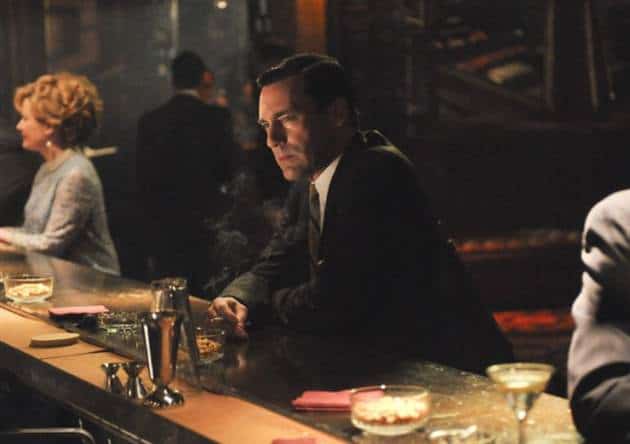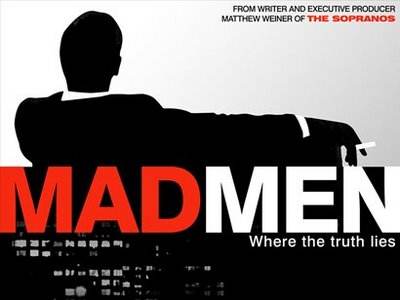
Broadly speaking, there are two types of people: those who believe in the “process,” and those who believe in “results.” The people who believe in the “process” are obsessed with doing things the way they should be done; they prioritize technique and craft above all else, and if they execute the thing in the correct manner, the outcome of the project is irrelevant. Those who believe in the “results” couldn’t give less of a crap how things get done; who cares, for example, if a boxer wasn’t in the greatest shape in that last fight? He won!
It’s not a black-and-white binary, of course; it’s closer to a spectrum than points A and B. But it is an accurate way to look at the manner in which people do things. Last night’s episode of Mad Men allowed us to explore that spectrum.
Americans are an interesting bunch; we mythologize those who fit our bootstrap narrative, and idolize those who get things done no matter what. Don Draper is the epitome of that contradiction. As a character, he has always prioritized “results” over “process”; he has always prioritized his success and pleasure center above all else. But he’s also a guy that has dug deep and found something artistic and creative within himself and has become a self-made man on that inner creativity. Don’s life, at first, seems full and rich because of his “results”-oriented attitude. His clients love him, he’s made a bunch of money, and he has the respect (if not awe) of his colleagues. But his personal life has always been in shambles. He has no relationship outside of the perfunctory with his children, and he and Betty never had a real relationship. He was getting “results,” but he wasn’t gaining any of the actual rewards: contentment, happiness, emotional growth.
My major complaint with Mad Men as a TV series is that it allows all other characters to evolve and grow but keeps Don in the same place, like an anchor to a past we can’t escape. But that sort of stunted growth can’t keep him at the top, no matter what the show might have us believe, and there had to be, at some point, an acknowledgement of faults and push-forward past them. I thought Season 5, with Megan, was going to be that turning point, but it was simply a detour, a mirage of actual human change in a desert of selfish sabotage. Season 6 began as an extension of Seasons 1-4; Don did what he wanted, with who he wanted. And then he lost Sally. He hurt his daughter, who had the misfortune of stumbling across his father with a woman who wasn’t her mother, who wasn’t the stepmom she had come to care about; it was just her father, hurting people like her mother had always said. Don was actually moved by this, but he still allowed Sally to lash out and do things that would get her expelled from boarding school and get her in trouble. He took her to the whorehouse because he wanted to give her a shorthand of his feelings, instead of actually discussing them. Don wanted his cake and the chance to eat it too; he wanted people to love him and he wanted to do what he wanted.
Don’s honesty with Sally with a result of him trying something different; he prioritized someone else above himself, of being honest and trying to build a relationship the right way, over immediate gratification. And lo and behold, Sally told him that she loved him. Amidst all of the crap he’d done to lose her respect, she still forgave him and loved him, because she could see that he was making an effort. The “process” had worked.
Now, we see Don come to another crossroads. He and Megan are finished; the fairy-tale divorce in which they cry and move on has faded, and only resentment remains as they bicker over money. Don and Diana, so sweet and tender and looking for something in each other for the last two episodes, are at a point in which things take the next step. Don gives Megan what she deserves, and Diana, too. But there is no reward this time; he comes back home and his stuff is gone. He stands in the middle of the beautiful New York apartment and literally has nothing to show for it. Don has always been about taking what he wants, opinion of others be damned; but Diana asked him to leave her alone and he did, and Megan asked him to treat her like an adult and he does. So he gets a broken heart and an empty apartment and an emptier bank account. This is his punishment, back taxes for a decade of treating people like playthings. The “process” worked again, but he was left with nothing, but with everything. His personal life is in much better shape than it was before, and that is so much better than anything money could buy.
But the process can go too far, as well. If you prioritize doing things the right way, denying yourself any sort of pleasure or enjoyment in the search for a larger prize, you’ll miss out on the good stuff. The near-triangle of Pima, Peggy, and Stan is a perfect example of that. You can line those three up at the extremes and at the middle of the spectrum: Peggy is “process,” Stan is “results,” and Pima is the comfortable middle. Peggy wants to be a great ad woman so bad that she can’t enjoy her success. She sees the brass ring and giant accomplishments so far and away in the clouds and she won’t do anything but strive for it. She turns down Pima’s advances not because she’s not interested, but because she sees it as the right thing to do. Stan, on the other hand, has everything, a great job, a doting girlfriend, and his art, but he is willing to throw it all away for the validation of a woman whom he doesn’t know, simply because he needs it right now. Pima, of course, gets to sleep with Stan and make a run at Peggy, and is unruffled by her failure. She gets it.
Roger is just like Don was, except that he has never cared about anyone but himself. He’s never really put anyone above himself, and therefore is constantly seeking some sort of contentment that he can never find. Megan’s mother calls him over to help her, and then he barely resists her advances, and stands there as she and Megan scream at each other with him in the middle. And all he can do is shrug and make a stupid face, because Roger got what he wanted at the expense of everyone else. That is what Don is starting at, every day. He can be Roger, with no contact with his family, constantly tearing lives apart with no regard, or he can improve. Or, he can come back to an empty apartment, with many less zeroes, with no one to spill red wine with, and understand that there is something better.
It remains to be seen which Don Draper we get, and if he’s here to stay. For my part, I really, desperately hope so.
Stray Thoughts
– This is longest review I’ve written since last year’s finale. I think this is better. Maybe a little overwritten; OR MAYBE YOU’RE JUST TOO DUMB TO UNDERSTAND MY BRILLIANCE!
– This was a really great episode of Mad Men. Sorry for turning it into an academic essay. It’s gonna keep happening, though.
-No Joan this episode, which is a crime.
– DON: I’ll throw my tie over my shoulder and roll up my sleeves. They’ll love it.
PETE (angrily): They probably will!
– PIMA: He hates himself.
PEGGY: Haha, I don’t think so. He has a huge ego.
– Sweet nine ounce, sixteen inch baby Jesus, let Harry Crane get a really awful STI. He’s the biggest, most disgusting cowardly snake in the whole universe. Amen.
[Photo via AMC]
 Follow Us
Follow Us




